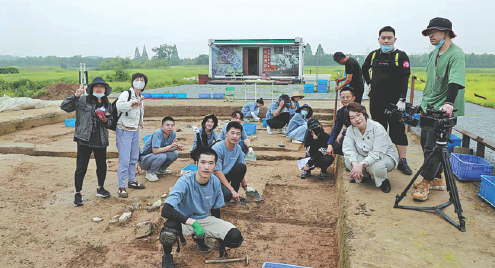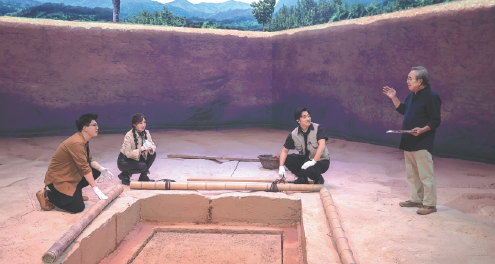Archaeology wins a wider audience


Visiting the sites
The latest discoveries saw visits to the Sanxingdui Museum this year rocket to 1.5 million, about double the number before the COVID-19 pandemic emerged in 2019.
Liu said: "Archaeology-themed tourism is a new trend… Developing such tourism can encourage local governments to place even stronger emphasis on protecting heritage sites, and is also a way to make heritage 'come alive'."
From 2016 to 2019, an average of 40 million annual visits were made to the 36 national-level archaeological ruins parks, according to the National Cultural Heritage Administration, which last month released guidelines for the development of these parks for the next five years. It planned to include 10 to 15 additional sites on this list by 2025 as the basis for public archaeology education.
Some sites have already opened excavations to the public.
The Archaeological Ruins of Liangzhu City, Hangzhou, Zhejiang province, became a World Heritage Site in 2019.Thought to be the remains of a regional state capital dating back 4,300 to 5,300 years, the site was home to a jade-worshipping civilization and the world's oldest-known dams.
An archaeological ruins park opened at the site when it gained World Heritage status. This year, the park attracted more than 2 million visits despite the pandemic.
More important, visitors can also experience being an archaeologist. Every Saturday and during major holidays this year, people who registered in advance joined archaeological studies at the park.
Tao Zhu, director of the administration's department in charge of heritage management at the Liangzhu site, said, "These visitors are instructed by professional archaeologists on the entire working process, ranging from how to use a trowel for excavations to piecing pottery shards together."
A total of 38 such activities have been organized this year, involving more than 450 visitors in fieldwork, Tao said. Police officers, students, office workers and various other groups far removed from archaeology in everyday life have joined this program.
More professionals have launched media appeals to urge people to visit heritage sites to assess the significance of these venues in a modern context.
Shan Jixiang, former director of the Palace Museum in Beijing, who retired in 2019, continues to promote public archaeology.

Last year, with archaeologists, scholars and a number of celebrities, he led production of The Shape of Culture, a Zhejiang TV program focusing on exploration of China's World Heritage sites.
"Heritage sites should be part of our lifestyle. Only when you visit them, can you really understand why they deserve your love," Shan said.
In the program's second season, which started on Dec 19, Shan began a new journey at the ancient city ruins in Luoyang, Henan, a metropolis that reached its peak during the Han (206 BC-AD 220) and Tang dynasties.
His other destinations include the ceramic kiln and port ruins in Quanzhou, Fujian province, which witnessed the prosperous Maritime Silk Road trade route, and Yinxu and Zhoukoudian.
Shan said he tries through the program to highlight the importance of the relationship between archaeology, heritage sites research and local communities' emotions and livelihoods.
For example, at the Luoyang site he discussed with movie stars whether historical architecture that has disappeared over time should be rebuilt based on archaeological findings.
Many scholars have said it should not, but Shan said residents in Luoyang need these cultural landmarks to be proud of their history.
"We need more debates like this to inspire people's thinking about the meaning of protecting and studying our past from under the ground," Shan said. "When visiting a site in the future, it shouldn't merely 'tick the box' for a place that I am familiar with. It's better to have your own ideas before you set off."
- China's CR450: A new era of high-speed rail at 400 km/h
- TAN SUO SAN HAO to pioneer future of deep-sea exploration
- Xi's discourses on Chinese modernization published in Japanese
- Officials summoned over alleged garbage bin food served to students
- Caring hearts help to enhance quality special education
- Xi sends condolences to South Korean acting president over plane crash




































